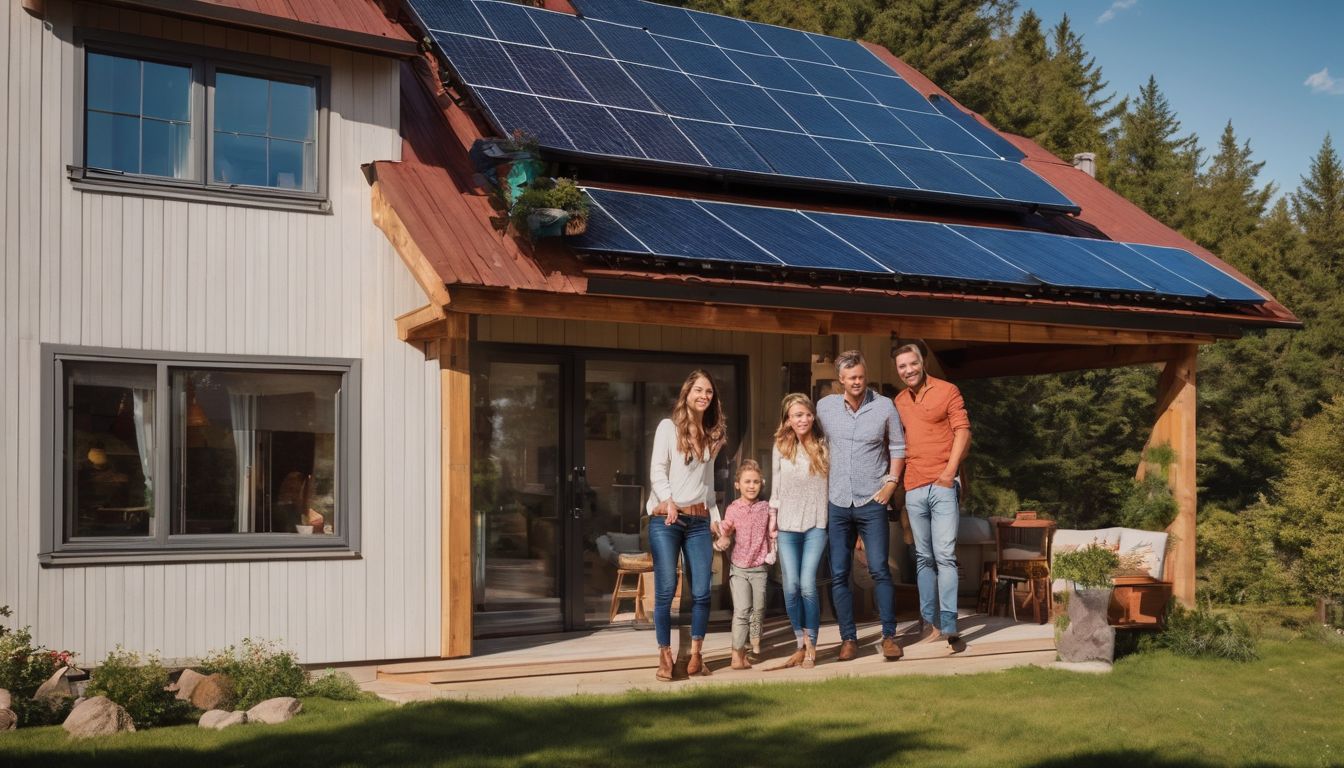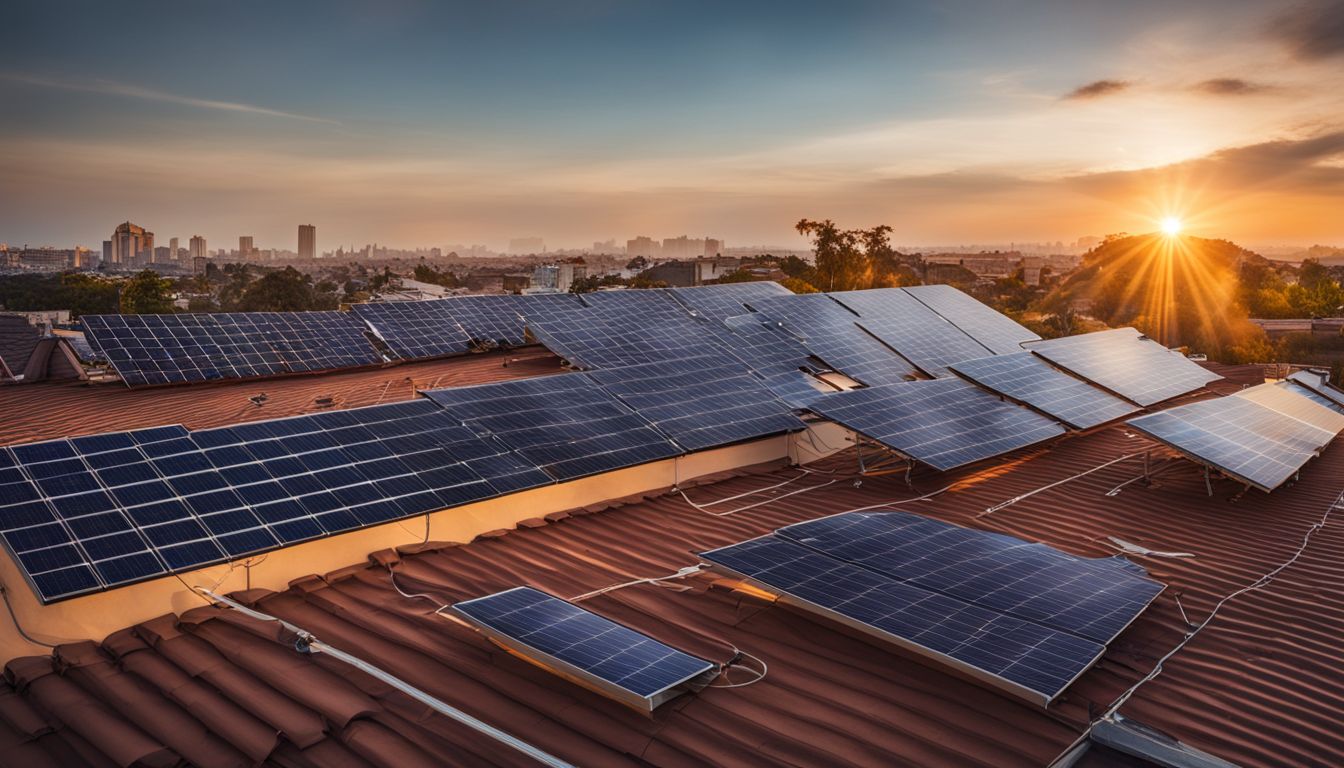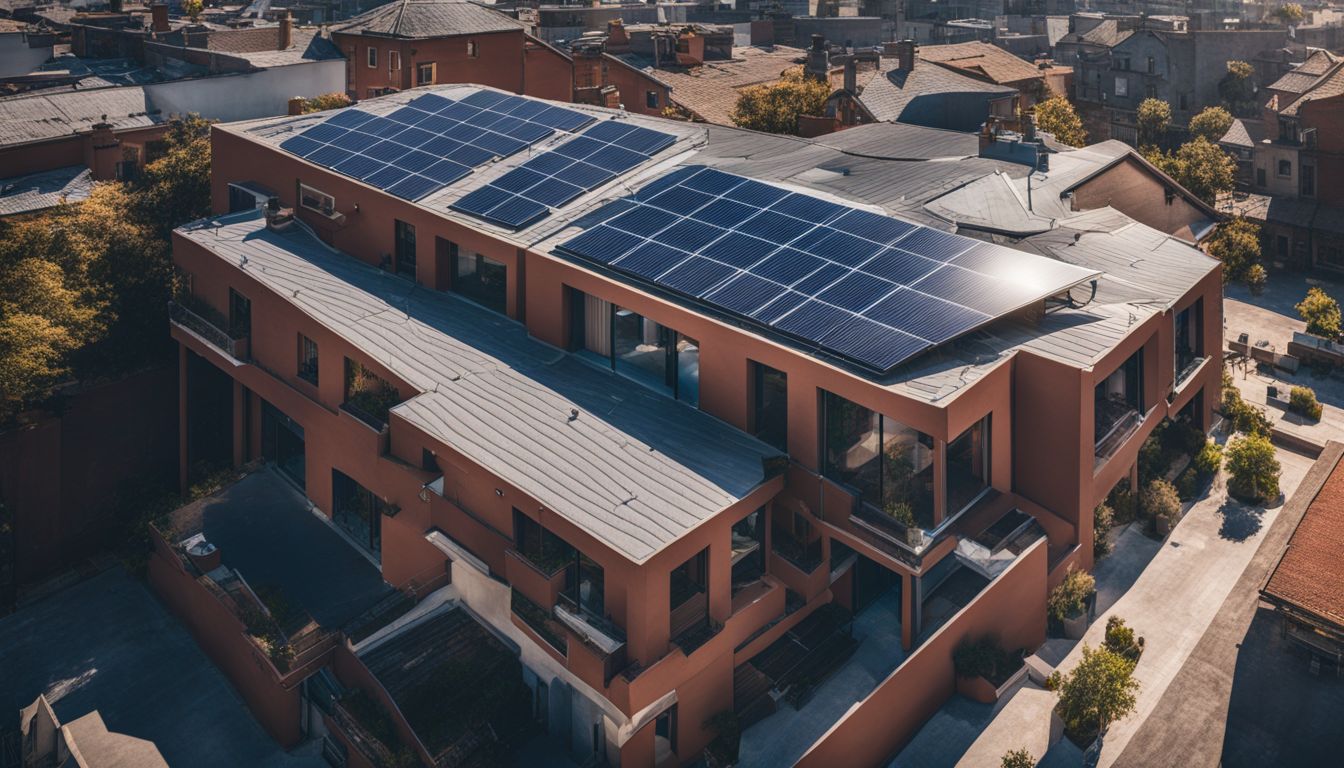How big of a solar system do I need to run my house?

Deciding on the right size solar system for your home can be puzzling. Interestingly, a typical UK household may need 10 to 20 panels to fully meet their power needs. This article will guide you through assessing your energy requirements and sunlight availability, simplifying the process of sizing your solar array.
Dive in to make the sun work for you!
Key Takeaways
- You need to know how much electricity your home uses and how much sun it gets to decide how many solar panels you need.
- The average US home might use 10 to 20 solar panels. How many exactly depends on whether the roof gets a lot of sun and other things.
- More powerful solar panels can make more electricity, so houses may need fewer of them.
- Even with just a few solar panels, some homes could get enough power if they don't use too much electricity.
- Putting in solar energy can save money on bills and help the planet by reducing pollution.
Understanding Solar Panels

Solar panels turn sunlight into electricity. Each panel has cells made from materials that get energy from light. This energy makes electricity flow through the wires in your house.
Solar panels come in different sizes and powers, measured in watts. More watts means more power.
You put solar panels on your roof or land where they can catch a lot of sun. They work best when they face the midday sun and there are no shadows covering them. Different places get different amounts of sunlight, which changes how much electricity you can make with solar panels.
It's important to know this when choosing how many panels you need for your home.
https://www.youtube.com/watch?v=khYZTmm7S5I
Determining the Number of Solar Panels Needed for Your Home

To determine the number of solar panels needed for your home, you will need to identify your home's energy usage, consider the amount of sunlight it receives, and understand the energy output of solar panels in your location.
These factors will help you calculate how many solar panels are required to power your household efficiently.
https://www.youtube.com/watch?v=TJBGbufexEM
Identify your home's energy usage
Check your electricity bills to find out how much energy you use in a month. Most homes use about 893 kilowatt-hours (kWh) per month. Knowing this helps you figure out the size of the solar system you need.
Look around your house and make a note of all the devices that use electricity and how often you use them. Things like TVs, computers, and lights can add up to your total energy consumption.
This information is key because it tells you how many solar panels will be needed to power your home with clean energy from the sun.
Consider the amount of sunlight your home receives
Your home's place in the sun matters a lot for solar panels. More sun means more energy from each panel. If your roof gets lots of light all day, you might not need many panels. But if tall trees or buildings cast shadows, you could need more to get enough power.
Houses facing south often get the most sunlight, which is great for solar power. The peak sun hours of your area are key too; that's how much sunshine hits directly on a sunny day.
In places with fewer peak sun hours, you'll need extra panels to catch what sunlight there is.
Understand the energy output of solar panels in your location
Solar panels turn sunlight into power. But not all places get the same amount of sun. To figure out how much energy your solar panels can make, you need to know about the sun in your area.
This is called "solar irradiance", and it changes with the weather and the seasons.
A sunny place will help solar panels create more electricity. In these areas, you might not need as many panels on your roof to get the energy you want for your home. The strength of each panel also matters; high-efficiency panels make more electricity than others do from the same light.
It's important to find out what kind of solar panel works best where you live.
Calculating How Many Solar Panels You Need
First, calculate your energy consumption, then analyse the sunlight exposure of your home and determine the energy output of solar panels in your area to find out the number of solar panels required.
Ready to take control of your home's energy production? Read on to learn more!
https://www.youtube.com/watch?v=pCoTa3sg_us
Step 1: Calculate your energy consumption
- Grab your electricity bills from the last 12 months.
- Look for the kilowatt-hours (kWh) you use each month. They are listed on the bill.
- Add up all the kWh numbers to get your yearly total.
- Divide your annual usage by 12 to find your average monthly energy use.
- Check if you use more electricity in certain seasons. This could affect solar power needs.
- Think about future changes, like buying an electric car or adding rooms to your house.
Step 2: Analyze the sunlight exposure of your home
- Look up peak sunlight hours for your area. This shows when the sun shines brightest and longest.
- Use a solar calculator or ask an expert. They can help find out how much sun hits your roof.
- Check to see if anything blocks the sun, like tall trees or buildings. These can shade your roof and reduce sun exposure.
- Consider the direction your roof faces. South-facing roofs often get more sun than those facing other directions.
- Think about the time of year. Sunlight changes with the seasons; some months may have less light available.
- Get to know your local weather patterns. Understand if you live in a place that's mostly sunny or cloudy.
- Factor in roof angle and size. These change how much sun reaches the solar panels throughout the day.
Step 3: Determine the energy output of solar panels in your area
- Look at your electricity bill to see how much energy you use each month.
- Get the average sun hours per day for your area from online solar maps or local solar experts.
- Find out the average power output of a solar panel in your area—this information often comes from solar panel sellers or installers.
- Use this formula: divide your monthly energy usage (in kilowatt-hours) by the number of sun hours per day, then divide by the panel's power output.
- This tells you how many kilowatts your system should produce daily to meet your needs.
- Check with local solar professionals—they understand regional weather patterns and can give insights on expected energy outputs throughout the year.
- Consider changes in seasons, as winter may have fewer sunlight hours, which affects your panel's performance.
Step 4: Calculate the number of solar panels required
- Divide your monthly energy consumption by the solar panel's wattage to determine the number of panels needed.
- Consider the average sunlight exposure in your area to adjust the number of panels accordingly.
- Take into account the efficiency of the solar panels to refine the calculation.
- Use an energy calculator to estimate the recommended solar array size and then divide it by the wattage quoted for individual solar panels.
Can a small number of solar panels power a house?
Yes, a small number of solar panels can power a house, depending on the energy needs and efficiency of the panels. Here are some key factors to consider:.
The average British home requires 15 to 19 solar panels based on its monthly electricity usage.
An average-sized UK home (2,480 sq ft) may need around 15 to 22 full-sized solar panels to replace traditional energy sources completely.
For a UK home consuming 10,572 kWh and requiring a 9 kW system, about 90 100-watt solar panels would meet its energy needs.
The number of solar panels needed also depends on the amount of power used during the day and whether the household is connected to the grid or operates off-grid.
Factors Influencing the Number of Solar Panels
The size of your house, the capacity of your roof to accommodate solar panels, and the power rating of the selected solar panels all play a crucial role in determining how big of a solar system you need.
Discover how these factors impact your decision by reading more.
The size of your house
The size of your house heavily influences the number of solar panels needed to power it. A larger house typically requires more solar panels to meet its energy needs, while a smaller house may need fewer panels.
This is because the quantity of solar panels required depends on how much electricity your household uses on average, and this often correlates with the size of the residence. Understanding this correlation can help homeowners make informed decisions when considering solar panel installations for their homes.
The capacity of your roof to accommodate solar panels
Your roof's size plays a pivotal role in determining the number of solar panels you can install. On average, a solar system costs between £12,000 and £17,000 and requires 260 to 340 square feet of roof space.
To figure out how many solar panels can fit on your roof, divide the available square footage by 15. This calculation considers that an average solar panel measures around 15-20 square feet.
So, when planning for your solar installation, it's essential to factor in the available space on your roof.
The power rating of the selected solar panels
Solar panels come with power ratings measured in watts, typically ranging from 250 to 400 watts for residential use. This rating is crucial in determining the number of panels needed to power your home.
The higher the wattage, the more energy a panel can produce under optimal conditions. It's important to consider solar output ratings based on ideal conditions for generating electricity, as they play a key role in determining the total power generation of a solar system.
When calculating how many panels you need, understanding and factoring in these power ratings is essential.
Frequently Asked Questions
Can I run my house on solar only? Is a 10 kW system sufficient to run a house? These are some common questions that homeowners have when considering solar power for their homes. Let's address these and other frequently asked questions in detail.
Can I run my house on solar only?
Running a house solely on solar power is feasible, but it requires careful planning and investment. Generally, a household needs around 17 to 21 solar panels to achieve this goal. However, going completely off-grid entails significant financial and time commitments.
It's essential to consider factors like energy usage, sunlight exposure, and the efficiency of solar panels in your region when determining if running your house on solar only is suitable for you.
The number of solar panels needed varies based on average electricity consumption. On average, an American home requires about 15 to 19 solar panels for its electricity needs. Understanding these factors can help determine the practicality and potential costs associated with transitioning to an entirely solar-powered household.
Is a 10 kW system sufficient to run a house?
A 10 kW solar system is more than enough to power an average home, especially for a family of four. Depending on your location, this size of system can adequately meet the energy needs of a 2,000-square-foot home.
In many cases, it can efficiently run essential household appliances and provide surplus energy for other needs.
When choosing the size of a solar system for your house, consider factors such as the number of occupants and daily energy consumption. A 10 kW system gives you the capacity to significantly reduce or eliminate your reliance on grid electricity while contributing to environmental sustainability through renewable energy usage.
The Benefits of Going Solar
Switching to solar energy offers a range of benefits. Firstly, it can save you money on your electricity bills in the long term. With solar panels installed, you can generate your own electricity and reduce reliance on the grid, leading to significant cost savings over time.
Additionally, harnessing solar power contributes to environmental sustainability by reducing carbon emissions and dependence on non-renewable energy sources. This shift towards renewable energy also allows homeowners to take advantage of various financial incentives and tax credits provided by governments or utility companies, making the initial investment more affordable.
Moreover, embracing solar power increases energy independence since you become less reliant on traditional utilities for your electricity needs. As a result, during power outages or disruptions, your home can still have access to electricity through battery storage systems.
Furthermore, installing a solar power system has been known to potentially increase property value—prospective buyers are increasingly attracted to homes with eco-friendly features that offer lower living costs due to sustainable energy practices.
Conclusion
To sum up, determining the right size of a solar system for your home involves analysing your energy usage, sun exposure, and the efficiency of solar panels in your area. By considering these factors and using the available calculators, you can estimate the number of solar panels needed to power your house.
It’s essential to install a solar system that can produce enough energy to offset your home’s electricity consumption. With careful planning and an understanding of your specific requirements, you can harness the power of solar energy to effectively run your household.
FAQs
1. What size solar panel system do I need for my home?
To determine the right size of solar panel systems for your house, you must consider your annual electricity usage, typically measured in kilowatt-hours (kWh). Solar installers can help you calculate this based on energy efficiency and past bills.
2. How does solar panel wattage affect my system size?
Solar panel wattage tells us how much power a single panel can produce under ideal conditions. The higher the wattage, the fewer panels you may need to cover your electricity costs.
3. Can installing a solar battery make my system more efficient?
Yes, when you add a solar battery to your PV system, it stores extra energy that's not used during sunny periods. This means that even when there’s no sun or at night, you can use stored power and increase overall efficiency.
4. Does where I live impact how much power my solar panels generate?
Indeed! Your location affects photovoltaic power potential because places with more sunshine will naturally have better conditions for solar production. Also, factors like rooftop space and whether net metering is available matter.
5. Will using energy-efficient appliances help reduce the size of the solar system I need?
Certainly, using less power through energy-efficient appliances reduces your total electricity needs; hence, smaller and possibly less costly systems could suffice while still achieving desired energy savings.
6. Are there financial benefits to having a bigger than-needed solar system?
Potentially, if local rules allow net metering, any excess energy produced by your larger system can be sold back to the grid, which lowers costs over time, plus federal tax credits and other incentives might apply as well.











